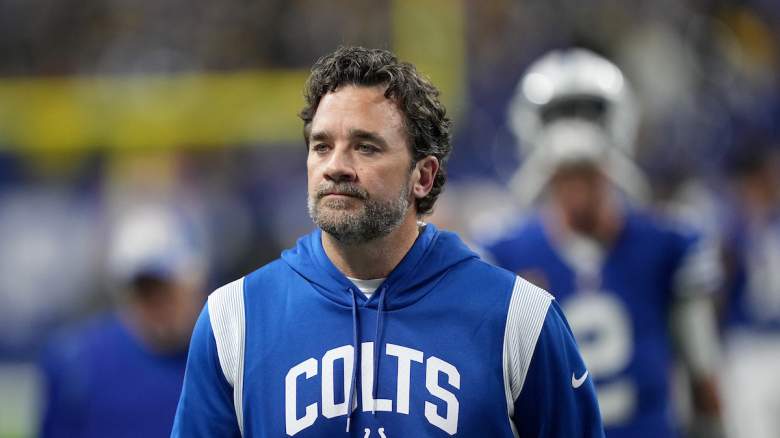
Getty Indianapolis Colts interim head coach Jeff Saturday criticized himself over some of his late-game decisions against the Pittsburgh Steelers in Week 12.
NFL coaches and players receive a 10-minute cooling off period before speaking to the media after games. This allows coaches to gather their thoughts and hopefully provide more insightful answers to the public.
But often times, 10 minutes isn’t enough time to reflect on the events of an entire 60-minute football game. That appeared to be the case for Indianapolis Colts interim head coach Jeff Saturday in Week 12.
During his postgame press conference after a 24-17 loss to the Pittsburgh Steelers on Monday Night Football, Saturday explained why he was so conservative in his usage of the team’s timeouts at the end of the fourth quarter. Rather than his clock management, he blamed Indianapolis’ failure to score on its final drive on executive.
Saturday, though, sang a little bit different tune when talking to the media again on November 29 — a little more than 12 hours after the loss.
“I wish I had that third down back,” Saturday told the media. “I wish I had used a timeout.”
Saturday Doubles Down But Also Expresses Regret Over Clock Management
In his postgame press conference, Saturday stated that he didn’t use any of his three remaining timeouts until there was 30 seconds left in the fourth quarter because he didn’t consider time on the clock to be a major factor yet.
“I didn’t feel like time was really of the essence at the moment,” Saturday said. “I felt good about the call [on third down] before. I felt like we had time, we would have timeouts afterwards. We were in striking distance. So yeah, I never felt the pressure of needing a timeout.”
Interestingly, on November 29, Saturday doubled down on the idea that the Colts had enough time to score a touchdown. But he expressed regret over not calling a timeout earlier because in hindsight, the Indianapolis offense was not ready to run a successful third-down attempt.
“From a time perspective, I felt good,” Saturday told the media on November 29. “But you could tell we were in disarray.”
Colts quarterback Matt Ryan scrambled for 14 yards on second-and-17 to advance to the Steelers 26-yard line. Many analysts said after the game that Saturday should have called a timeout at that moment.
But he didn’t, and the Colts called a running play with Jonathan Taylor on third-and-3. When the Steelers defense stopped Taylor for no gain, Saturday finally called the team’s first timeout.
About 20 seconds rolled off the clock from the end of Ryan’s scramble until Saturday called that timeout.
A Learning Experience for Saturday
One could argue that Saturday’s usage of his timeouts was his “welcome to the NFL moment” as a head coach. Saturday still doesn’t even have one month’s worth of experience as an NFL coach.
But what Saturday lacks in experience he will try to make up for in accountability.
“It’s a learning experience,” Saturday said when continuing to talk about his timeout usage on the final drive. “I hold the guys accountable. I’m accountable for that.”
“Frustrated with myself on that.”
Saturday said after the game that he liked the third-down play call to run with Taylor. The Colts interim head coach added that the team just didn’t execute.
But upon a film study of the play, Indianapolis had rookie tight end Jelani Woods, who is a much better pass catcher than blocker, assigned to block Steelers outside linebacker Alex Highsmith.
The Pittsburgh edge rusher explained to the media after the game that he recognized the call was going to be a running play because of where Woods was lined up in the team’s formation. Highsmith then easily beat Woods’ block and tackled Taylor for no gain.
Sure, Woods didn’t execute the block, but had the play call not been hurried, perhaps the Colts wouldn’t have assigned their rookie pass-catching tight end a blocking assignment against a veteran outside linebacker.
A timeout could have saved some valuable seconds, but more importantly, the Colts could have called a better play on the most critical third down of the contest.
